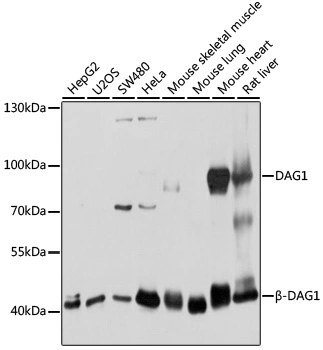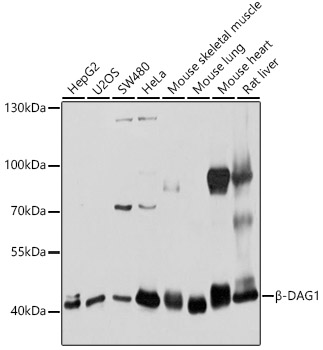
WB analysis of mouse and rat skeletal muscle lysate using GTX88089 DAG1 antibody, Internal. Dilution : 0.1microg/ml Loading : 35microg protein in RIPA buffer
DAG1 antibody, Internal
GTX88089
ApplicationsWestern Blot
Product group Antibodies
ReactivityHuman, Mouse, Rat
TargetDAG1
Overview
- SupplierGeneTex
- Product NameDAG1 antibody, Internal
- Delivery Days Customer9
- Application Supplier NoteWB: 0.1-0.3microg/ml. *Optimal dilutions/concentrations should be determined by the researcher.Not tested in other applications.
- ApplicationsWestern Blot
- CertificationResearch Use Only
- ClonalityPolyclonal
- Concentration0.50 mg/ml
- ConjugateUnconjugated
- Gene ID1605
- Target nameDAG1
- Target descriptiondystroglycan 1
- Target synonyms156DAG, A3a, AGRNR, DAG, LGMDR16, MDDGA9, MDDGC7, MDDGC9, dystroglycan 1, dystroglycan 1 (dystrophin-associated glycoprotein 1)
- HostGoat
- IsotypeIgG
- Protein IDQ14118
- Protein NameDystroglycan 1
- Scientific DescriptionThis gene encodes dystroglycan, a central component of dystrophin-glycoprotein complex that links the extracellular matrix and the cytoskeleton in the skeletal muscle. The encoded preproprotein undergoes O- and N-glycosylation, and proteolytic processing to generate alpha and beta subunits. Certain mutations in this gene are known to cause distinct forms of muscular dystrophy. Alternative splicing results in multiple transcript variants, all encoding the same protein. [provided by RefSeq, Nov 2015]
- ReactivityHuman, Mouse, Rat
- Storage Instruction-20°C or -80°C,2°C to 8°C
- UNSPSC12352203



![IHC-Fr analysis of human skeletal muscle using GTX01940 DAG1 / beta Dystroglycan antibody [43DAG1/8D5]. Staining is localized in the sarcolemma of the fibers.](https://www.genetex.com/upload/website/prouct_img/normal/GTX01940/GTX01940_20200811_IHC-Fr_106_w_23053121_152.webp)

